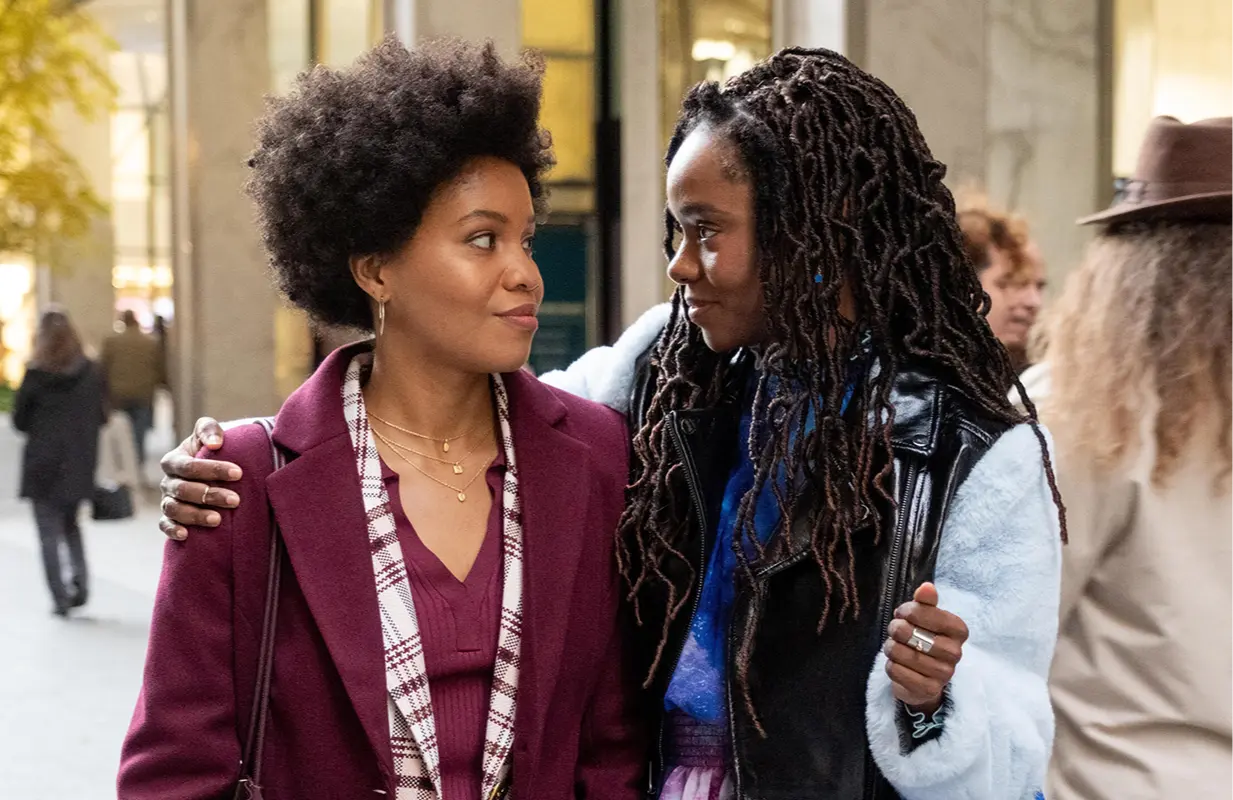A Dream Job Becomes a Nightmare in Hulu's The Other Black Girl
-
 Sinclair Daniel and Ashleigh Murray star in The Other Black Girl (Photo: Hulu)
Sinclair Daniel and Ashleigh Murray star in The Other Black Girl (Photo: Hulu)If you’ve ever worked in an office, you’ll likely vibe with Hulu’s The Other Black Girl, a dark comedy tinged with suspense and moments of outright disbelief. The 10-part series, which is based on Zakiya Dalila Harris’ bestselling novel of the same name, takes an incisive look at the travails of the lone Black woman at a New York publishing company, sending up awful executives while also examining white privilege and climbing the corporate ladder.
But even more compelling than the commentary on how hard Black people have it in the broader publishing industry is the journey of a particular Black editor, Kendra Rae Phillips (Cassi Maddox), who struggles against the long history of white supremacy that her company has upheld. The show opens in 1988, when a publishing company by the name of Wagner Books was in its heyday. It’s soon revealed that Kendra is the only Black editor in Wagner’s history. In a frightening scene early on, Kendra runs out of the office after realizing that her work headshot is surrounded by photos of only white men, tugging at her hair before jumping into a New York subway. Several white train passengers give her the evil eye and she screams in terror.
Back in the present day, Nella (Sinclair Daniels), an editorial assistant, is doing her best to impress her boss Vera (Bellamy Young) and frankly, everyone at the company. Wagner's office culture, which is rife with privilege and overt macroaggressions, is on prominent display here. Like many in the company, Vera claims to love Nella’s work and even talks to her about a promotion. But this turns out to be all talk; it’s just a way for Vera to deflect from her own toxicity, complicity with institutional racism, and how she treats Nella as a pet.
This adds to the show’s ominous tone, especially as it explores what it means to be the only Black person in a predominately white space. Nella struggles to be the perfect assistant, vying for attention and an editorial job that’s never actually within reach. There are several moments where we feel bad for Nella, wondering why she doesn’t just quit and go work for another publishing company. But, as Nella observes to her best friend — and the show’s comedic relief — Malaika (Brittany Adebumola), “these kinds of jobs are hard to come by” for Black people.
Nella temporarily finds validation in her Black co-worker Hazel (Ashleigh Murray), who claims to understand the culture of publishing and the elitism at places like Wagner Books, and just how hard Nella has it. Sadly, Nella learns that she is still climbing the corporate ladder alone, because Hazel is prone to gaslighting her with respectability politics, even blaming her for her own hardships at work. This causes Nella to be that much harder on herself, which is all too common for Black people in professional spaces.
Soon, Nella and Hazel have a falling out over Nella’s need to address the racism in one of Wagner's upcoming releases. Although Hazel cheers her on and notes that she “has her back,” Nella realizes that this was all just a ploy for Hazel to impress Wagner executives. But Hazel is able to weasel her way back into Nella’s good graces by bonding with her over Kendra Rae Phillips’ work. We then learn what really happened to Kendra, and that Nella is following in her footsteps in more ways than one. The internalized misogynoir and tense tokenism that play out in both Nella and Kendra’s experiences really hit home and remind us how frightening office politics can be for Black people in corporate culture.
Like Them and Lovecraft Country, The Other Black Girl comments on the ways Blackness is diluted and disrespected in our society, but the show's subtler messaging about how Black people are treated in the workplace is even more effective. Along with the theme of being cautious about who you trust in a work environment, Harris and showrunners Jordan Reddout and Gus Hickey craft a tense examination of the dangers of proximity to whiteness, and how Black people’s desire to “fit in” can actually drive us insane. But the show’s real hero is Malaika, who reminds us that not all skin folk are kinfolk and quickly calls Hazel out on her semantics. Not only does she ask all the right questions, she’s also the only one challenging all of the Black characters to be cautious of what they put in and on their bodies, which becomes a pivotal plot point.
Though The Other Black Girl throws a lot at the viewer, the cast act as guides through this exploration of white supremacy in corporate culture. Nella’s and Kendra’s stories in particular are testaments to the struggles that Black people deal with when navigating systematic oppression in the workplace — they’re also a reminder that Black people are striving for success in a system that was never built for them, and that sometimes that thing you dream of achieving just might end up being your worst nightmare.
The Other Black Girl premieres as a binge-release September 13 on Hulu. Join the discussion about the show in our forums.
Jonathan P. Higgins is a freelance writer who has been published at sites including Essence, Ebony, and Out Magazine, in addition to winning season 5 of Nailed It. You can follow them online by using the handle @DoctorJonPaul.
TOPICS: The Other Black Girl, Hulu, Ashleigh Murray, Bellamy Young, Brian Baumgartner, Cassi Maddox, Eric McCormack, Sinclair Daniels, Zakiya Dalilia Harris